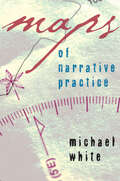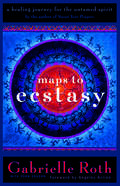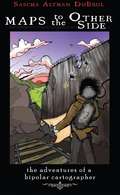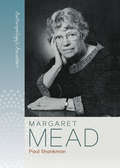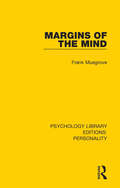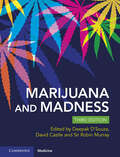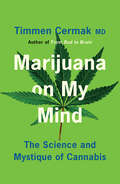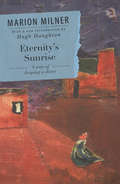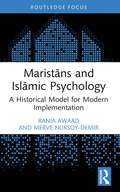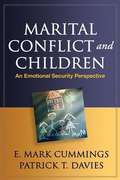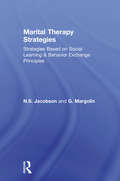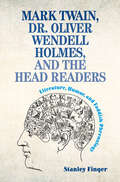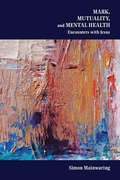- Table View
- List View
Maps of Narrative Practice
by Michael WhiteMichael White, one of the founders of narrative therapy, is back with his first major publication since the seminal Narrative Means to Therapeutic Ends, which Norton published in 1990. Maps of Narrative Practice provides brand new practical and accessible accounts of the major areas of narrative practice that White has developed and taught over the years, so that readers may feel confident when utilizing this approach in their practices. The book covers each of the five main areas of narrative practice-re-authoring conversations, remembering conversations, scaffolding conversations, definitional ceremony, externalizing conversations, and rite of passage maps-to provide readers with an explanation of the practical implications, for therapeutic growth, of these conversations. The book is filled with transcripts and commentary, skills training exercises for the reader, and charts that outline the conversations in diagrammatic form. Readers both well-versed in narrative therapy as well as those new to its concepts, will find this fresh statement of purpose and practice essential to their clinical work.
Maps to Ecstasy: The Healing Power of Movement
by Gabrielle RothIn this revised edition of Maps to Ecstasy, Gabrielle Roth expands on the themes that have guided her — ways of transforming daily life into sacred art. Her work in teaching movement has been described as a marriage of art and healing. Each chapter initiates readers into one of the five sacred powers necessary for survival and reveals the five life cycles that lead to enlightenment. The creative process brings readers in touch with these five sacred powers by freeing the body to experience the power of being, expressing the heart to experience the power of loving, emptying the mind to experience the power of seeing, and embodying the spirit to experience the power of healing.
Maps to the Other Side: Adventures of a Bipolar Cartographer
by Sascha Altman DubrulPart mad manifesto, part revolutionary love letter, part freight train adventure story-Maps to the Other Side is a self-reflective shattered mirror, a twist on the classic punk rock travel narrative that searches for authenticity and connection in the lives of strangers and the solidarity and limitations of underground community.<P><P> Beginning at the edge of the internet age, a time when radical zine culture prefigured social networking sites, these timely writings paint an illuminated trail through a complex labyrinth of undocumented migrants, anarchist community organizers, brilliant visionary artists, revolutionary seed savers, punk rock historians, social justice farmers, radical mental health activists, and iconoclastic bridge builders. This book is a document of one person's odyssey to transform his experiences navigating the psychiatric system by building community in the face of adversity; a set of maps for how rebels and dreamers can survive and thrive in a crazy world.
Margaret Mead
by Kate MaguireThis book makes a case for Margaret Mead's contributions to education discourses, which in retrospect appear visionary and profoundly democratic, non judgemental and transdisciplinary, and for their relevance for education today at primary, secondary and tertiary levels. Mead combined her substantial skills and knowledge as a linguist, anthropologist and psychologist to draw attention to the primary role of culture and society in identity formation, privileging against sterner perspectives, the idea that the conditions that support the emergence of balanced personalities, able to contribute to society and to progress themselves as individuals, starts with observation of self before that of others. This observation of and reflection on self was for her a necessary demonstration of transparency while close observation of others was 'an act of love', much as the artist contemplates his/her subject, that dissolved negative differences of culture, belief and status.
Margaret Mead: A Life
by Jane HowardComprehensive biography of the pioneering cultural anthropologist.
Margaret Mead: Anatomy Of An Anthropological Controversy (Anthropology's Ancestors #1)
by Paul ShankmanTracing Mead’s career as an ethnographer, as the early voice of public anthropology, and as a public figure, this elegantly written biography links the professional and personal sides of her career. The book looks at Mead’s early career through the end of World War II, when she produced her most important anthropological works, as well as her role as a public figure in the post-war period, through the 1960s until her death in 1978. The criticisms of Mead are also discussed and analyzed. This short volume is an ideal starting point for anyone wanting to learn about, arguably, the most famous anthropologist of the twentieth century.
Marginalisierte Gefühlswelten: Eine empirische Untersuchung der emotionalen Integrationsverläufe von Migrant*innen in Deutschland (Analysen zu gesellschaftlicher Integration und Desintegration)
by Coline KucheSubjektive Faktoren wie Emotionen von Personen mit Migrationshintergrund sind bisher ein Randthema in der sozialwissenschaftlichen Forschung. Daher untersucht die Studie migrantische Emotionserfahrungen im Zuge von Integrationsprozessen. Drei Forschungsfragen leiten die Untersuchung: "Gibt es emotionale Unterschiede zwischen Migrant*innen aus unterschiedlichen Herkunftsländern und der Aufnahmebevölkerung?", "Wie entwickeln sich emotionale Befindlichkeiten von Migrant*innen im Zeitverlauf?", "Welchen Einfluss üben sonstige Integrationsprozesse auf die emotionale Integration aus?". Für die Beantwortung der Fragen wird u.a. auf innovative Ansätze aus der Emotionssoziologie und Kulturpsychologie zurückgegriffen. Die abgeleiteten Hypothesen werden anhand der Daten des Sozio-oekonomischen Panels (SOEP), einer repräsentativen Bevölkerungsstichprobe Deutschlands überprüft. Die Studie legt offen, dass emotionale Unterschiede zwischen Personen mit und ohne Migrationshintergrund sowie in Abhängigkeit der kulturellen Distanz bestehen, welche sich durch das häufigere Auftreten von negativen Emotionserfahrungen für Migrant*innen äußern. Diese Unterschiede nehmen im Zeitverlauf eher zu oder stagnieren. Dabei stehen diese hauptsächlich in Zusammenhang mit wahrgenommenen Benachteiligungserfahrungen und einem Mangel an transnationalen Kontakten.
Margins of the Mind (Psychology Library Editions: Personality)
by Frank Musgrove‘Psychologists have mapped out developmental stages for the first fifteen to twenty years; but thereafter life is a blank. Half a century of adult life remains, psychologically speaking, an unchartered waste.’ Frank Musgrove focuses on the question ‘Can adults change?’ and challenges the still widely-held view that adult life is static. Originally published in 1977, the author examines change principally in terms of a modification of consciousness through the experience of marginality. With the help of interviews, he discusses seven groups in contemporary Britain at the time, found in the ‘margins’ of society. Three of the selected groups are involuntary and stigmatized: men and women who have gone blind as adults; handicapped people in a home for the incurably disabled; and homosexuals. The other four groups enjoy high-status and voluntary marginality: late-entrants to the Anglican ministry; self-employed artists; a Sufi commune of Islamic mystics; and a Hare Krishna commune. Frank Musgrove’s lively study of adult resocialization will be of interest to sociologists, anthropologists and anyone concerned with the general problem of adjustment to rapid social change. It also relates marginality to the issue of life-long learning and points to some of the creative possibilities of the marginal situation.
Marian Apparitions in Cultural Contexts: Applying Jungian Concepts to Mass Visions of the Virgin Mary (Research in Analytical Psychology and Jungian Studies)
by Valeria Céspedes MussoMarian Apparitions in Cultural Contexts provides an analysis of collective phenomena, specifically mass visions of the Virgin Mary, from a psychoanalytical perspective. It draws from Jung’s compensation theoretical model with the aim of merging depth-psychology and historical material from the Zeitoun case. Offering an original interpretation of this phenomenon from a Jungian psychological perspective, the book provides stimulating insights to any person interested in these supernatural events, whether general readers with active curiosity or scholars with broad intellectual interests. <P><P>A review of the literature points to a prevailing socio-political approach to examining visions of the Virgin Mary, while a psychoanalytical approach is generally lacking. Musso draws from Jung’s compensation theoretical model in Flying Saucers with the aim of merging depth-psychology and historical material. Common themes and symbols are extracted and interpreted from the empirical material and analyzed along with Egyptian social and political data. The book concludes with a discussion on how depth psychological principles grounded in empirical and historical material could be applied in order to explicate cases of mass visions. <P><P>An original interdisciplinary exploration of cultural phenomena, Marian Apparitions in Cultural Contexts will be of value to academics and students in the fields of psychoanalysis, analytical psychology, political science, and religious studies. This book will also be of interest among Jungian scholars and practitioners in applications of depth psychology to cultural phenomena.
Marijuana and Madness
by David Castle Sir Robin M. Murray Deepak Cyril D'SouzaThe second edition of this critically acclaimed and award-winning text provides a comprehensive overview of the psychiatry and neuroscience of Cannabis sativa (marijuana). It outlines the very latest developments in our understanding of the human cannabinoid system, and links this knowledge to clinical and epidemiological facts about the impact of cannabis on mental health. Clinically focused chapters review not only the direct psychomimetic properties of cannabis, but also the impact consumption has on the courses of evolving or established mental illnesses such as schizophrenia. Effects of cannabis on mood are reviewed, as are its effects on cognition. This new edition has been extensively updated and expanded with 10 new chapters to incorporate major new research findings. This book will be of interest to all members of the mental health team, as well as to neuroscientists, epidemiologists, public health specialists and those involved in drug and alcohol research.
Marijuana and Madness
by David J. Castle Deepak Cyril D’Souza Murray, Sir Robin M.An updated third edition of this award-winning book provides a comprehensive overview of the complex associations between cannabis and mental illness. Organised into easy to navigate sections, the book has been fully revised to feature eight entirely new chapters covering important novel aspects. Marijuana and Madness incorporates new research findings on the potential use of cannabinoids, and synthetic cannabinoids, in an array of mental illnesses, balanced against the potential adverse effects. The associations between cannabis and psychosis, developing putative models of 'cannabis induced' psychosis and pathways to schizophrenia are all covered. The book importantly discusses the impact of exposure to cannabis at various stages of neurodevelopment (in utero, in childhood, and during adolescence) and it thoroughly reviews the treatments for cannabis dependence and health policy implications of the availability of increasingly high potency cannabis. This book will quickly become an essential resource for all members of the mental health team.
Marijuana on My Mind: The Science and Mystique of Cannabis
by Timmen CermakMarijuana is on everyone's mind. Why do so many people enjoy it? What is it doing in our brains? Is it safe for everyone to use? What should we be telling our children? What are the benefits of medical marijuana? How does CBD live up to its hype? Does marijuana have spiritual power? And with so much conflicting information out there, how do we begin to make up our own minds about cannabis? Marijuana on My Mind is for anyone who has ever experienced the mystique of cannabis or wondered exactly how cannabis works. With over 40 years of clinical experience, Dr Timmen Cermak uses science to make sense of the endless debate between advocates and opponents of cannabis and provides answers to some of the greatest mysteries surrounding marijuana.
Marine Biomaterials: Therapeutic Potential
by Sougata Jana Subrata JanaThis book provides updated information on marine-based biomedical carriers and their therapeutic potential. Marine biomaterials and bio-based carriers show wide application in pharmaceutical and biomedical fields to deliver small and large molecules. Biomaterial-based composites, scaffolds, or matrix systems are sound systems for controlled and prolonged drug release in target sites and control the premature release of drugs or bioactive compounds. This book discusses essential topics such as the therapeutic potential of marine collagen, management of bone disorders, gene delivery, natural marine compounds in immunomodulation, theranostic applications, tissue engineering, and regeneration. It also describes the use of marine biopolymers in cancer therapy. Different chapters describe the tissue engineering techniques to develop these carriers. Marine biomaterial-based systems are popular for tissue engineering and biomedical imaging.This book is ideal for industry experts, students, and researchers in pharmaceutical sciences and pharmacology.
Marine Mammals: The Evolving Human Factor (Ethology and Behavioral Ecology of Marine Mammals)
by Bernd Würsig Giuseppe Notarbartolo di SciaraThe seventh volume in the series “Ethology and Behavioral Ecology of Marine Mammals” describes aspects of the often-complex relationship between humans and marine mammals. From a primeval condition of occasional predators, during the last century humans have become a major factor negatively affecting the status of most marine mammals through over-hunting, habitat encroachment and environmental degradation. This has led to the extirpation of many marine mammal populations and even to the extinction of species. However, in parallel to this destructive drive, since antiquity humanity has been influenced by a strong fascination for marine mammals, which contributes today to an increased human appreciation of the natural world admixed with widespread concern for its degrading condition. The special status occupied by marine mammals in human imagination and affection stands in stark contrast with the current predicament of many populations still threatened by the doings of Homo sapiens: a condition emblematic of the relationship of humanity with nature, and key to understanding where humanity is heading.
Mario Bunge: A Centenary Festschrift
by Michael R. MatthewsThis volume has 41 chapters written to honor the 100th birthday of Mario Bunge. It celebrates the work of this influential Argentine/Canadian physicist and philosopher. Contributions show the value of Bunge’s science-informed philosophy and his systematic approach to philosophical problems.The chapters explore the exceptionally wide spectrum of Bunge’s contributions to: metaphysics, methodology and philosophy of science, philosophy of mathematics, philosophy of physics, philosophy of psychology, philosophy of social science, philosophy of biology, philosophy of technology, moral philosophy, social and political philosophy, medical philosophy, and education. The contributors include scholars from 16 countries.Bunge combines ontological realism with epistemological fallibilism. He believes that science provides the best and most warranted knowledge of the natural and social world, and that such knowledge is the only sound basis for moral decision making and social and political reform. Bunge argues for the unity of knowledge. In his eyes, science and philosophy constitute a fruitful and necessary partnership. Readers will discover the wisdom of this approach and will gain insight into the utility of cross-disciplinary scholarship. This anthology will appeal to researchers, students, and teachers in philosophy of science, social science, and liberal education programmes.1. IntroductionSection I. An Academic Vocation (3 chapters)Section II. Philosophy (12 chapters)Section III. Physics and Philosophy of Physics (4 chapters)Section IV. Cognitive Science and Philosophy of Mind (2 chapters)Section V. Sociology and Social Theory (4 chapters)Section VI. Ethics and Political Philosophy (3 chapters)Section VII. Biology and Philosophy of Biology (3 chapters)Section VIII. Mathematics (3 chapters)Section IX. Education (2 chapters)Section X. Varia (3 chapters)Section XI. Bibliography
Marion Milner
by Marion MilnerIn this series, Emma Letley has worked with the Marion Milner estate to re-contextualise six classic volumes by arranging for experts to provide new scholarly introductions to each book. This six volume pack comprises: The Hands of the Living God On Not being Able to Paint Eternity's Sunrise A Life of One's Own An Experiment in Leisure. Bothered by Alligators These volumes will be useful and relevant to seasoned analysts as well as those new to Milner's work, making them attractive to a whole new generation of readers from both inside and outside of the psychotherapy profession.
Marion Milner: A Contemporary Introduction (Routledge Introductions to Contemporary Psychoanalysis)
by Alberto Stefana Alessio GambaThis focused and thorough book by Alberto Stefana and Alessio Gamba delves into Marion Milner’s contribution to psychoanalytic clinical theory and technique. The authors offer an overview of Milner’s work as a psychoanalyst, writer, and gifted painter. They bring to light how each of her clinical concepts and theorisations have been shaped by predecessors and, in turn, have inspired subsequent analysts. The importance of imaginative scenarios for both patient and therapist within the analytic context is particularly emphasised. The authors conclude by focusing on the retained clinical relevance of Milner’s contribution for contemporary psychoanalysis. Marion Miler: A Contemporary Introduction is essential for students of psychoanalysis, as well as academics and psychoanalytic practitioners interested in the clinical-theoretical work of this pioneer in psychoanalysis.
Marion Milner: The Life
by Emma LetleyArtist, poet, educationalist and autobiographer, Marion Milner is considered one of the most original of psychoanalytic thinkers whose life (1900-1998) spans a century of radical change. Marion Milner: The Life, is the first biography of this extraordinary woman. It introduces Milner and her works to the reader through her family, colleagues and, above all through her books, charting their evolution and development as well as their critical reception and contribution to current twenty-first century debates and discourses. In this book Emma Letley draws on primary sources, including the newly-opened Marion Milner Collection at the Archives of the British Psychoanalytical Society in London, as well as interviews and the re-contextualised series of Milner texts. She traces the process of Milner's writing of her books, her discovery of psychoanalysis, her training and her place in that world from the 1940's onwards. Marion Milner: The Life includes discussion of Milner's connection with D.W. Winnicott and her emergence as a most individual member of the Independent Group. Letley also shows how Milner's Personal Notebooks offer fascinating insights into her relationships, both personal and professional, and into many of her important ideas on creativity, the body-mind relationship, her revolutionary ideas on education and her particular personality as clinician working with both children and adults. Further, Letley explores Milner's literary character from her very early diaries and narratives to her last book written in her 90's published in 2012. Marion Milner: The Life places Marion Milner firmly in her Edwardian family setting and contains new material from primary sources, including a new view of her collegial connections. It provides a wealth of material on her life and works that will be invaluable to psychoanalysts, psychotherapists, art psychotherapists, students, those involved with life writing and autobiography, and the general reader.
Maristāns and Islāmic Psychology: A Historical Model for Modern Implementation (Islamic Psychology and Psychotherapy)
by Rania Awaad Merve Nursoy-DemirMaristāns and Islāmic Psychology outlines how the novel methods, tools, and approaches for treating psychological illnesses developed in the maristāns (hospitals) of the Muslim world can be utilised today in formulating a practical implementation of Islāmic psychology (IP). As a trademark of the Islāmic Civilisation, the maristāns were institutions of healing that boasted the world’s first treatment centres for treating psychological illnesses. They also served as the centres where theoretical concepts developed by early Muslim scholars—physicians, theologians, and philosophers—who contributed to the creation of IP were translated into practical, clinical applications.A detailed examination of the treatment modalities within these historical treatment centres provides a promising model for creating a holistic approach to psychological healing that is grounded in Islāmic heritage. This text completes such an examination, highlighting the practical IP treatment methods in fourteen maristāns geographically spread throughout the Muslim world in order to bridge this centuries-long model of psychological care to the modern context.As part of the Islāmic Psychology and Psychotherapy Focus series, this book provides a foundation for mental health professionals who either directly deliver mental health services or are involved in creating theories, institutions, or spaces of IP and psychotherapeautic practices.
Marital Conflict and Children
by Patrick Davies E. Mark CummingsFrom leading researchers, this book presents important advances in understanding how growing up in a discordant family affects child adjustment, the factors that make certain children more vulnerable than others, and what can be done to help. It is a state-of-the-science follow-up to the authors' seminal earlier work, Children and Marital Conflict The Impact of Family Dispute and Resolution. The volume presents a new conceptual framework that draws on current knowledge about family processes; parenting; attachment; and children's emotional, physiological, cognitive, and behavioral development. Innovative research methods are explained and promising directions for clinical practice with children and families are discussed.
Marital Instability and Divorce Outcomes: Issues for Therapists and Educators
by Craig EverettClinicians and educators in the marriage and family field will gain valuable insight into the relationship dynamics that cause marital stress and the interactional factors that may result in divorce from this excellent book. The perceptive theoretical, empirical, and clinical chapters included in Marital Instability and Divorce Outcome examine why certain elements in relationships result in divorce while others do not and assist professionals in evaluating these elements. Specifically, this provocative volume enables professionals to examine how a marriage has weathered developmental periods of stability and instability, whether or not it has the necessary resources to survive, and, in the event a divorce occurs, what will be the most likely post-divorce adjustment for the marriage partners. This informative volume aids professionals in their work with marital relationships, by covering a wide range of topics involved in assessing marital instability and divorce outcomes. The relationship circumstances that can lead to divorce are examined in an investigation of personality types which are prone to divorce and a comparison of patterns of relationships which are stable and those which are likely to result in divorce. The conditions that exist after a divorce are explored in a discussion on how to predict post-divorce adjustment and physical well-being of the marriage partners after divorce. Educators teaching marriage and family courses at all levels from high school to college and clinicians who work with marital, family, and child cases will find this helpful volume to be an invaluable resource for evaluating factors influencing marital instability and divorce outcome.
Marital Tensions: Clinical Studies Towards a Psychological Theory of Interaction (Psychology Revivals)
by Henry V. DicksOriginally published in 1967, this book gathers together the various aspects of Dr Dick’s theoretical and clinical approach to marriage difficulties into a coherent system for the benefit of professional workers and students who were concerned with family and community psychiatry and case work at the time. He preserves the essentials of the steps by which his concepts developed from one-person therapy into hypotheses for understanding interaction, with the couple as the unit of study.
Marital Therapy Strategies Based On Social Learning & Behavior Exchange Principles
by N.S. Jacobson G. MargolinThe techniques described here are the familiar ones of establishing contracts and contigencies and training in communication and problem-solving skills. As the reader will see, these techniques are eminently teachable. The fact that they are described here and that they are teachable suggests that clinical technology has stepped forward a long way from the arcane mysteries which characterized psychotherapy efforts in the late 1950s and early 1960s. The aspect of this work which sets it clearly in the forefront is the emphasis upon soft clinical skills as being a necessary .
Mark Twain, Dr. Oliver Wendell Holmes, and the Head Readers: Literature, Humor, and Faddish Phrenology
by Stanley FingerHaving a phrenological 'head reading' was one of the most significant fads of the nineteenth century – a means for better knowing oneself and a guide for self-improvement. Samuel Clemens (Mark Twain) had a lifelong yet long overlooked interest in phrenology, the pseudoscience claiming to correlate skull features with specialized brain areas and higher mental traits. Twain's books are laced with phrenological terms and concepts, and he lampooned the head readers in Tom Sawyer and Huckleberry Finn. He was influenced by Dr. Oliver Wendell Holmes, who also used his humor to assail head readers and educate the public. Finger shows that both humorists accepted certain features of phrenology, but not their skull-based ideas. By examining a fascinating topic at the intersection of literature and the history of neuroscience, this engaging study will appeal to readers interested in phrenology, science, medicine, American history, and the lives and works of Twain and Holmes.
Mark, Mutuality, And Mental Health: Encounters With Jesus
by Simon MainwaringMainwaring explores the societal contexts of those who suffer poor mental health, and in particular the relational dynamics of how identity, agency, and dialogue are negotiated in personal encounters. This work seeks to serve as an experiment, such that interested readers might better understand the dynamics of relational power that pervade encounters with persons with poor mental health. Features: Foucauldian analysis of the relational dynamics of poor mental health used to re-imagine hegemonic relational dynamics Close readings of encounters between individual characters to evaluate how mutuality operates in those encounters Study of mutuality as it has emerged in mental health literature, feminist theologies, and theologies of disability
